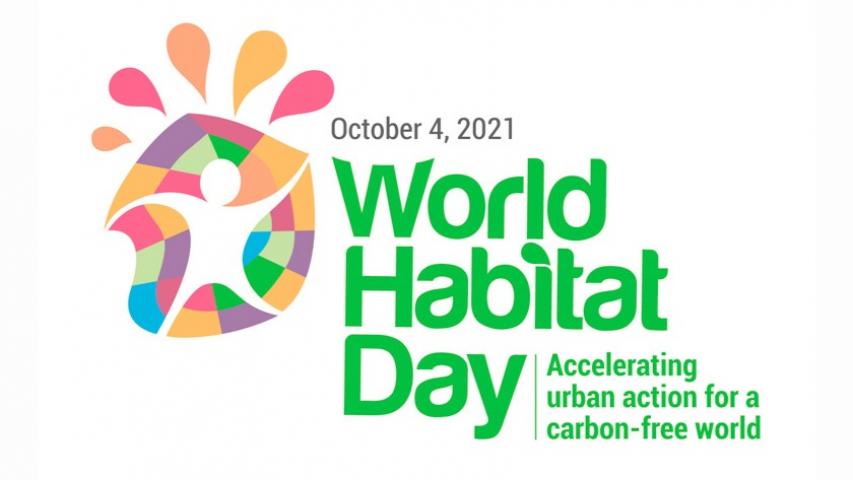Goal: Accelerating urban action for a carbon-free world
Early this week we celebrated World Habitat Day, a date set on the first Monday of October by the United Nations to make us reflect on the state of people' habitats and on the basic right of all to have adequate housing.
This year, the global event has focused on the importance of "Accelerating urban action for a carbon-free world", since, according to the international organisation, cities are responsible for 70% of these emissions. The European Union (EU) has also tried to respond to this problem through community policies and strategies that advocate a climate-neutral Europe by 2050, in which construction plays a fundamental role.
Construction currently accounts for more than 35% of total waste in the EU. For this reason, Europe is asking the sector to extend the life of buildings, reduce the carbon footprint and include minimum requirements on the resources and materials used in construction, in addition to promoting energy efficiency. Circular economy has been postulated as one of the solutions to increase performance and give a second life to materials.
Moving from a linear to a circular economy model would mean making a leap towards a more sustainable industry and complying with the green transition. However, redefining the current model and shifting economic activity away from the consumption of finite resources, improving waste disposal or focusing on recycling is no easy task, as it produces mismatches between the needs of the labour market and the workforce.
What does it entail to apply a circular economy model on construction sites?
According to the Ellen MacArthur Foundation, a founding member of the Platform for Accelerating the Circular Economy (PACE), the circular economy model is based on three principles:
- Eliminating waste and pollution from the design phase.
- Keeping products and materials in use, that is, extending their useful life.
- Regenerating natural systems.

Committing to the circularity of building processes is presented as the most viable option to achieve a carbon neutral, sustainable, toxic-free economy that reduces Construction and Demolition Waste (C&DW), as approved by the European Parliament in February 2021.
Construction sector will need one million more workers by 2025
In recent years, construction has been gaining weight in world economies, not only as a key sector in the renewal of cities, but also as a sector with a future at the forefront of the labour market. It is estimated that by 2025, the industry will need one million new workers. One of the most demanded skills will be to meet the needs of green buildings (Cedefop, 2020). Therefore, promoting training in energy efficiency, renewable energy and sustainable building systems has become the main focus of the sector at national and international level.

Fundación Laboral works everyday to bring the sector closer to this 'green' future, through European projects that seek to train workers in sustainable skills, as is the case of Construction Blueprint (Erasmus+), Construye 2020+ (Horizon 2020), RCdiGREEN (Interreg Poctefa) or CDWaste-ManagementVET (Erasmus+). Another example is Green Growth, an initiative co-funded by the European Commission's Erasmus+ programme, which promotes the development of skills to meet the challenge of the circular economy in construction.
Together with six other institutions from Germany, Belgium, Italy, Slovenia and Spain, Fundación Laboral aims to provide training tools based on circular economy principles and their practical applications in construction for teachers and professionals in the sector, with the objective of equipping them with skills that enable their practical application and help to consolidate these principles in the operation and organisational culture of the training centres.
Green Growth raises circular economy as a cross-cutting issue
The project is doing its bit to tackle the environmental crisis by offering a training strategy that makes the circular economy a cross-cutting issue in the sector and enables workers and SMEs to work on the basis of circular criteria of resource use and efficient or sustainable management. In this way, Green Growth seeks to respond to the ecological demands of buildings and the new regulations on waste management and emissions.

On 30 September and 1 October, the project partnership met in Slovenia to present the new Green Growth website and discuss the results of the European initiative. The project is currently working on the development of:
- A handbook on "Circular Economy in Practice" for vocational education and training (VET) teachers in the construction sector, which includes pedagogical material based on real cases.
- A course on the circular economy skills that teachers in the sector should have in order to promote it as a cross-cutting subject.
- An application (app) on circular principles in refurbishment works aimed at operators and SMEs.
- A series of recommendations addressed to training centres to manage and include the circular economy as a transversal subject in their training itineraries and in the management of the centre itself.

The European Commission support for the production of this publication does not constitute an endorsement of the contents which reflects the views only of the authors, and the Commission cannot be held responsible for any use which may be made of the information contained therein.









